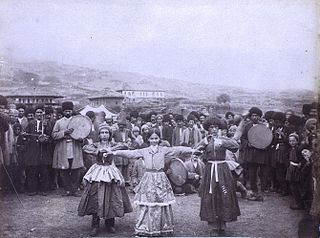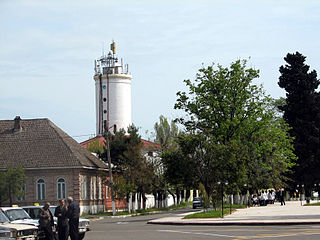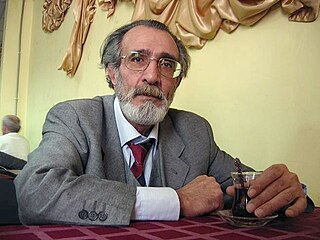Talish-i Gushtasbi is the historical name of the northern Talish area, presently a part of the Republic of Azerbaijan. During the Abbasid Caliphate, there was a region called Gushtasfi. People of northern Talysh are of Iranian stock and speak a northwestern Iranian language called Talysh. The chief cities of the mentioned area are Lankaran, Lerik, Masally and Astara. Talysh language speaking people lives mainly in Astara, Lerik, Lankaran, and in Masally constitutes only small part of population.

The Talysh people or Talyshis, Talyshes, Talyshs, Talishis, Talishes, Talishs, Talesh are an Iranian ethnic group, with the majority residing in Azerbaijan and a minority in Iran. They are the indigenous people of the Talish, a region on the western shore of the Caspian Sea shared between Azerbaijan and Iran. The main city of the Talysh people and their homeland is Lankaran, the majority of the population of which is ethnically Talysh. They speak the Talysh language, one of the Northwestern Iranian languages. The majority of Talyshis are Shiite Muslims.

Lankaran is a city in Azerbaijan, on the coast of the Caspian Sea, near the southern border with Iran. As of 2021, the city had a population of 89,300. It is next to, but independent of, Lankaran District. The city forms a distinct first-order division of Azerbaijan.

Talysh-Mughan, officially known as the Talysh-Mughan Autonomous Republic, was a short-lived autonomous republic in Azerbaijan that lasted from June to August 1993.

International organizations have frequently alleged that Azerbaijan has violated human rights standards established in international law.

This article focuses on ethnic minorities in the Republic of Azerbaijan.
Novruzali Khanmammad oğlu Mammadov was an Azerbaijani philologist, journalist and activist of Talysh ethnicity. He was the founder and editor of the now-defunct newspaper Tolyshi Sado. Mammadov also worked at the Nasimi Institute of Linguistics of the Azerbaijan National Academy of Sciences and headed a Talysh cultural center, which was closed after his imprisonment.

Alikram Hummatov or Ali Akram Hummatzade was an Azerbaijani Talysh military commander and political activist. He was the president of the self-proclaimed Talysh-Mughan Autonomous Republic in 1993 and was imprisoned in Azerbaijan. He was considered as a political prisoner by international organizations including Amnesty International and the Council of Europe. After demands from the Council of Europe, Hummatov was granted retrials, yet according to Human Rights Watch report, the authorities conducted him inside prisons, and with procedural violations. He was pardoned in 2004 and stripped of his Azerbaijani citizenship; he lived in exile in the Netherlands.

Caucasian Knot is an online news site that covers the Caucasus region in English and Russian. It was established in 2001 and Grigory Shvedov is the editor-in-chief. It has a particular focus on politics and on human rights issues, including freedom of the press.

The 1993 Azeri coup d'état, also known as the Ganja Uprising, was a military coup led by Azerbaijani military commander Surat Huseynov. On June 4, 1993, Huseynov's forces lead a march from the city of Ganja to the Azerbaijani capital of Baku in order to overthrow President Abulfaz Elchibey who was elected in independent Azerbaijan's first free election in 1992.
Tālīsh is a region in the southwestern coast of the Caspian Sea. It is a homeland of the indigenous Talysh people, who inhabit the region and speak the Talysh language. The territory and the language set apart Talish from its neighbors.
The Talysh People's Party —political party of the Talysh people, founded in 1991 in Azerbaijan.
Talysh people were subjected to forced assimilation policy in Azerbaijan SSR. The policy was carried out jointly with the creation and propagation of the narratives by the authorities of the Azerbaijan SSR and Soviet ethnographers, alleging the "complete and voluntary assimilation of Talysh people into Azerbaijanis" in Soviet Azerbaijan. The narrative was created to justify the assimilation policy of the leadership of the Azerbaijan SSR towards the Talysh people and was distributed through various means, including encyclopedias, maps and textbooks. A similar policy was also pursued in relation to the Tats, Georgian-Ingiloy and other peoples of the Azerbaijan SSR.

The Sadval movement, or simply Sadval, meaning "Unity"; is a Lezgin political movement, whose initially stated goal was to address the perceived discrimination and marginalization of their community in Azerbaijan. Formed in July 1990 in Dagestan, the Sadval movement addressed issues important to both Russian and Azerbaijani Lezgins. Around the same time, prior to the imminent breakup of the former Soviet Union, other ethnic minority groups in the region began to assert their own cultural and political identities
Shirali Akhundov was a Talysh public politician, revolutionary, deputy chairman of the Regional Council of the Mugan Soviet Republic and сhairman of the Lankaran district executive Committee.
Fakhraddin Aboszoda was a Talysh rights activist and historian. He was a leader of the Talysh national movement. He was a chairman of the majlis (parliament) of the Talysh-Mughan Autonomous Republic within Republic of Azerbaijan.
Azerbaijan has had a deliberate policy of forced assimilation of ethnic minorities since Soviet times and up to the present. Non-Turkic peoples, such as Talyshis, Lezgins, Tats and others have been subjected to forced Azerbaijanization (Turkification).









